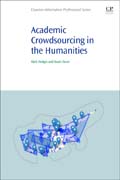
Crowdsourcing in the Humanities Lays the foundations for a theoretical framework to understand the value of crowd-sourcing. Crowd-sourcing is becoming increasingly important to academia as the Web transforms collaboration and communication and blurs institutional and professional boundaries. Crowd-sourcing projects in the humanities have for the most part focused on the generation or enhancement of content in a variety of ways, leveraging the rich resources of knowledge, creativity, effort and interest among the public to contribute to academic discourse. Moreover, they have largely been insular activities, identifying a specific challenge that crowd-sourcing might be used to address, and then trying to meet the challenge using methods and technologies adapted from crowdsourcing in other areas, such as the sciences or business. However, collectively, these activities have raised important questions about the nature and value of such forms of collaboration with the wider public, the processes it involves, the affordances it provides, and the challenges it raises. This study will address these questions by laying the foundations for a theoretical framework in which the value of crowd-sourcing can be understood, based on a systematic analysis of crowd-sourcing concepts, methodologies and projects, that locates crowd-sourcing within the family of related (but distinct) concepts such as 'citizen science', 'the 'wisdom of crowds', and 'public engagement'. Addresses crowd-sourcing for the humanities and cultural material Provides a systematic, academic analysis of crowd-sourcing concepts and methodologies Situates crowd-sourcing conceptually within the context of related concepts such as 'citizen science', 'wisdom of crowds', and 'public engagement' INDICE: 1. Introduction: crowd-sourcing and other practices 2. From citizen science to community co-production 3. Processes and products: a typology of crowd-sourcing 4. Case Studies 5. Communities, roles and relationships 6. Motivation and reward 7. Crowd-sourcing and the creation of value 8. Infrastructures of crowd-sourcing 9. Crowd-sourcing and memory 10. Conclusion: Crowds past, present and future
- ISBN: 978-0-08-100941-3
- Editorial: Chandos Publishing
- Encuadernacion: Rústica
- Páginas: 300
- Fecha Publicación: 01/11/2017
- Nº Volúmenes: 1
- Idioma: Inglés
